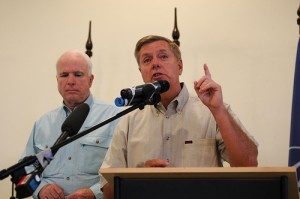The Unspeakable Tragedy of Homeless Drones
Yesterday, I speculated on whether Pakistan’s Prime Minister Nawaz Sharif was turning his back on his campaign promise of peace talks with the Taliban so that he could seek US counterterrorism funds suddenly not being used in Afghanistan. Today’s New York Times joins me in pointing out the key role of counterterrorism in an important US-Pakistan meeting in Washington today:
Secretary of State John Kerry is to meet Pakistan’s foreign and national security policy adviser, Sartaj Aziz, here on Monday, and counterterrorism operations are to be a major subject of discussion, a senior State Department official said Sunday.
The Times article, however, centers on a key piece of context that I hadn’t brought into yesterday’s speculation. The growing likelihood that all US troops will be forced to withdraw from Afghanistan by the end of this year in the absence of a signed Bilateral Security Agreement means that the US needs a new home for its drones:
The risk that President Obama may be forced to pull all American troops out of Afghanistan by the end of the year has set off concerns inside the American intelligence agencies that they could lose their air bases used for drone strikes against Al Qaeda in Pakistan and for responding to a nuclear crisis in the region.
/snip/
The concern has become serious enough that the Obama administration has organized a team of intelligence, military and policy specialists to devise alternatives to mitigate the damage if a final security deal cannot be struck with the Afghan president, Hamid Karzai, who has declined to enact an agreement that American officials thought was completed last year.
If Mr. Obama ultimately withdrew all American troops from Afghanistan, the C.I.A.’s drone bases in the country would have to be closed, according to administration officials, because it could no longer be protected.
Oh, the horrors of it all! Who can bear the tragedy of all those poor, homeless drones, wandering around the world with no base close enough for a rapid trip inside the borders of a sovereign nation that has stated in no uncertain terms that it considers drone strikes to be illegal and to be war crimes?
The Times article reminds us that the US once used a base inside Pakistan for drone flights:
Their base inside Pakistan was closed after a shooting involving a C.I.A. security contractor, Raymond Davis, and the raid into Pakistani territory that killed Osama bin Laden, both in 2011.
That bit simplifies the Shamsi Air Base story a bit. While it is true that Pakistan stated that they were kicking the US off the base in June of 2011, not very long after the Osama bin Laden raid (and a bit longer after the Raymond Davis fiasco), the US didn’t actually leave the base until December, after the US killed 24 Pakistani troops at a border station.
So it would seem to me that in today’s talks with Aziz, Kerry will be dangling a couple billion dollars that will be Pakistan’s for the taking, but only if they meet two conditions. Condition one will be to continue Sharif’s new-found enthusiasm for attacking militant groups and condition two will be to re-open Shamsi air base for the US to continue drone operations.
Should such an agreement come to pass, it would completely invalidate the elections that Pakistan held last May, in which Pakistan for the very first time experienced a peaceful transition from one elected government to another. One of Sharif’s main campaign points was the establishment of peace talks with the Taliban. He now is carrying out military actions against them instead. Imran Khan, who came in second in the election, campaigned on a pledge to end US drone strikes. Opening a base inside Pakistan for US drones would render votes cast for Khan meaningless.
Perhaps the only solace that the US would be able to offer Pakistan should they agree to re-open Shamsi to drones would be that after the formal US withdrawal from Afghanistan, the base in Shamsi would almost certainly be used by the US to violate Afghanistan’s sovereignty on a regular basis, just as the US has been doing lately to Pakistan from Afghanistan.

